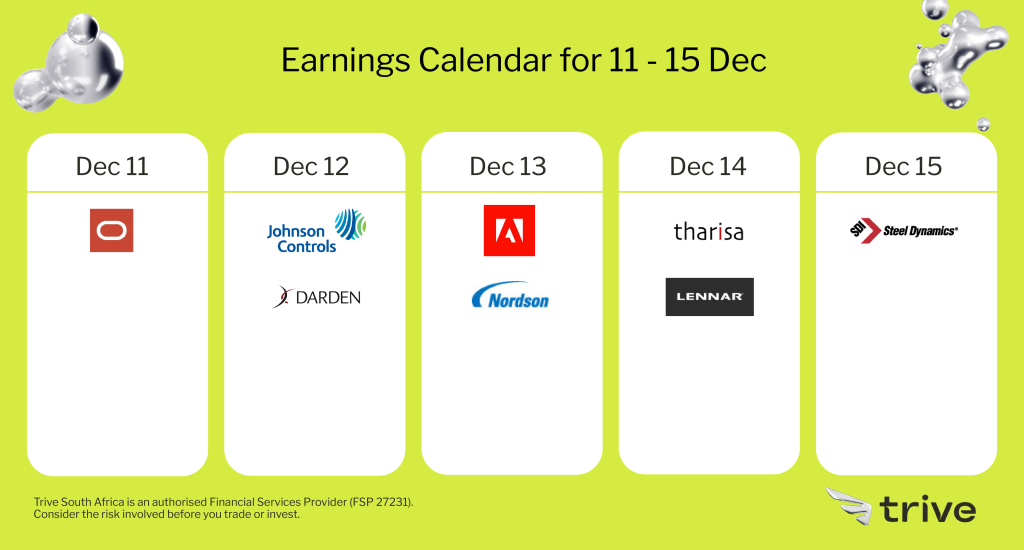
Update 18 December
South African Inflation Eases: A Ray of Hope Amidst Fed’s Hawkish Shadow
South Africa’s consumers breathed a sigh of relief as November saw a dip in inflation, offering a glimmer of hope amidst global economic uncertainty. According to Stats SA, the consumer price index (CPI) cooled to 5.5% year-on-year in November, down from 5.9% in October. This marks a welcome respite from the months of rising prices that had squeezed household budgets and stoked concerns about affordability.
Several factors might be contributing to this easing inflation. Global commodity prices, particularly for oil and food, have stabilized in recent months, providing some relief on the import front. Additionally, base effects, where current inflation figures are compared to higher numbers from the previous year, could also be playing a role. Finally, government policy measures aimed at curbing inflation, such as fuel price adjustments, might be starting to show their effect.
However, the shadow of global economic uncertainty, particularly the US Federal Reserve’s hawkish stance on interest rates, continues to loom large. The Fed’s aggressive rate hikes, aimed at combating inflation in the US, have sent ripples across global markets, potentially impacting South Africa’s borrowing costs and economic growth. While recent signs of slowing economic growth in the US might hint at a possible shift in the Fed’s stance, it remains too early to declare victory against inflation.
RMB Holdings (JSE: RMH)
RMB Holdings, the South African financial services giant, released its reviewed condensed consolidated results for the half year ended 30 September 2023, painting a picture of mixed performance against a backdrop of challenging market conditions. While the company reported a net income and improved its return on equity (ROE), a closer look reveals significant revenue declines and operational hurdles that warrant closer attention.
RMB Holdings posted a net income of ZAR 15 million, a significant turnaround compared to the ZAR 514 million loss recorded in the same period last year. A special dividend of 23.5 cents per share was announced, a signal of the board’s confidence in future cash flow. Revenue plummeted from ZAR 125 million in the previous year to a mere ZAR 72 million, highlighting a concerning trend. Both the corporate and investment banking (CIB) and personal and business banking (PBB) divisions experienced profit declines, raising concerns about core business performance.
RMB Holdings acknowledges the persisting difficulties in the South African economy, with rising inflation and interest rates impacting their operations.
ORACLE CORP (NYSE: ORCLE)
Oracle, the tech giant known for its database software, navigated a choppy fiscal Q2 2024, delivering mixed results that paint a picture of contrasting fortunes. While cloud services surged, the company grappled with declining license sales and ongoing operational challenges.
The good news? Oracle’s cloud business continued its impressive ascent, with total cloud revenue growing 25% year-over-year. This growth was driven by strong performance in both cloud infrastructure (52% growth) and SaaS offerings like NetSuite and Fusion Cloud ERP (both up 21%). Overall, cloud services now represent nearly 37% of total revenue, highlighting its increasing importance for Oracle’s future.
However, the picture wasn’t entirely rosy. Legacy on-premise and cloud license revenue saw a concerning decline of 18% year-over-year. This could be attributed to factors like customer migration to cloud solutions and increased competition in the enterprise software market. Adding to the complexity, Oracle continues to face operational challenges. The company’s cost-to-income ratio remains high, indicating inefficiencies that need to be addressed. Additionally, some analysts expressed concerns about the company’s ability to fully integrate its recent acquisitions, adding pressure on management to demonstrate smooth execution.
Despite the mixed performance, Oracle remains confident in its long-term prospects. The company’s continued focus on cloud growth, coupled with its large installed base and strong brand recognition, provide a solid foundation for future success. However, addressing operational inefficiencies and navigating the evolving software landscape will be crucial for Oracle to maintain its competitive edge.
Sources: SENS; RMB Website; Moneyweb; Reuters; Bloomberg; Financial Times; CNBC
Disclaimer: Trive South Africa (Pty) Ltd, Registration number 2005/011130/07, and an Authorised Financial Services Provider in terms of the Financial Advisory and Intermediary Services Act 2002 (FSP No. 27231). Any analysis/data/opinion contained herein are for informational purposes only and should not be considered advice or a recommendation to invest in any security. The content herein was created using proprietary strategies based on parameters that may include price, time, economic events, liquidity, risk, and macro and cyclical analysis. Securities involve a degree of risk and are volatile instruments. Market and economic conditions are subject to sudden change, which may have a material impact on the outcome of financial instruments and may not be suitable for all investors. When trading or investing in securities or alternative products, the value of the product can increase or decrease meaning your investment can increase or decrease in value. Past performance is not an indication of future performance. Trive South Africa (Pty) Ltd, and its employees assume no liability for any loss or damage (direct, indirect, consequential, or inconsequential) that may be suffered from using or relying on the information contained herein. Please consider the risks involved before you trade or invest.




